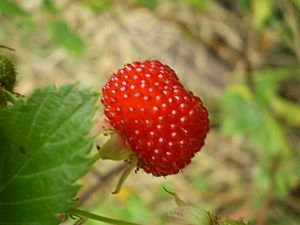Atherton raspberry facts for kids
Quick facts for kids Atherton raspberry |
|
|---|---|
 |
|
| Conservation status | |
|
Least Concern (NCA)
|
|
| Scientific classification |
|
| Kingdom: | Plantae |
| Clade: | Tracheophytes |
| Clade: | Angiosperms |
| Clade: | Eudicots |
| Clade: | Rosids |
| Order: | Rosales |
| Family: | Rosaceae |
| Genus: | Rubus |
| Species: |
R. probus
|
| Binomial name | |
| Rubus probus L.H.Bailey
|
|
| Script error: The function "autoWithCaption" does not exist. | |
| Synonyms | |
|
Rubus muelleri F.M.Bailey |
|
Script error: No such module "Check for conflicting parameters".
The Rubus probus, commonly called the Atherton raspberry or wild raspberry, is a type of scrambling shrub. It belongs to the Rosaceae family, which includes many well-known plants like roses and apples. This plant is originally from parts of Malesia and Queensland, Australia.
Contents
Discovering the Atherton Raspberry
The Atherton raspberry is a fast-growing plant. Like most plants in the Rubus group, it can form thick, thorny patches. These patches can be quite dense.
What the Atherton Raspberry Looks Like
The leaves of the Atherton raspberry are compound. This means each leaf is made up of several smaller parts called leaflets. Usually, there are five oval-shaped leaflets on each leaf.
- Each leaflet is about 4 to 10 centimeters (1.5 to 4 inches) long.
- They are also about 2 to 5 centimeters (0.8 to 2 inches) wide.
- The edges of the leaflets have deep teeth, like a saw blade.
Flowers and Fruit
The Atherton raspberry produces flowers during spring and summer. After the flowers, bright red fruits grow. These fruits are called aggregate fruits, meaning they are made up of many small parts joined together.
- Each fruit is about 10 to 20 millimeters (0.4 to 0.8 inches) across.
- The fruits are safe to eat and taste good!
Where it Grows and How it's Used
This plant is native to tropical areas. You can find it naturally in parts of Malesia and Queensland, Australia.
In Australia, the Atherton raspberry has been grown on farms. It is sometimes grown as a "cool season" fruit. This means it grows best when the weather is not too hot. The fruits are often sold in small containers called punnets.
 | Shirley Ann Jackson |
 | Garett Morgan |
 | J. Ernest Wilkins Jr. |
 | Elijah McCoy |

